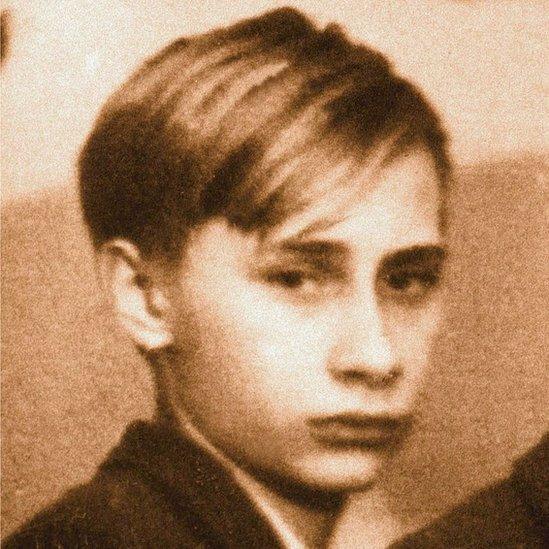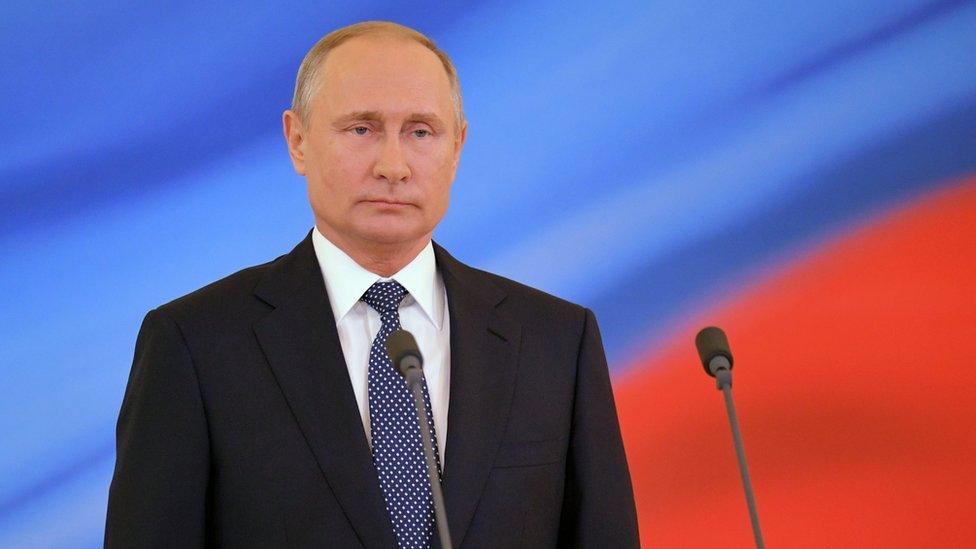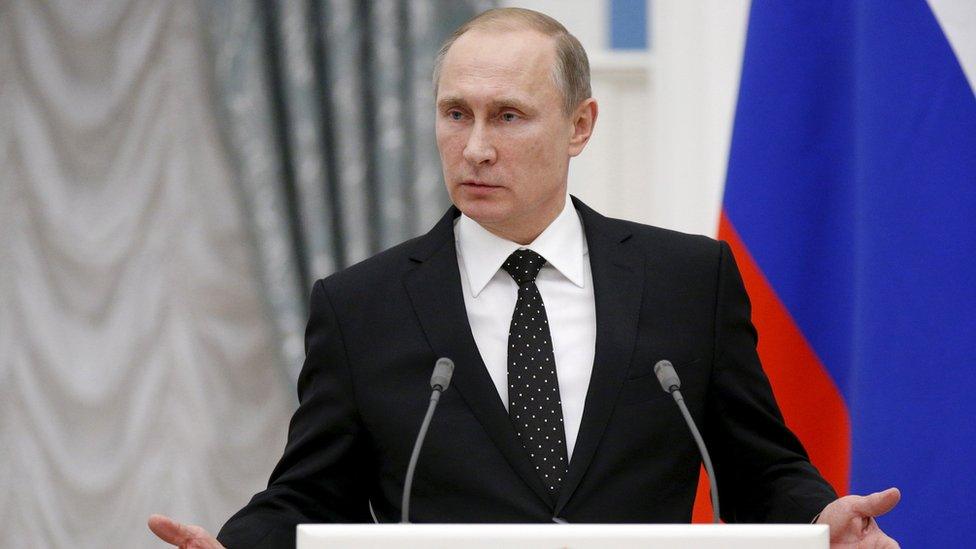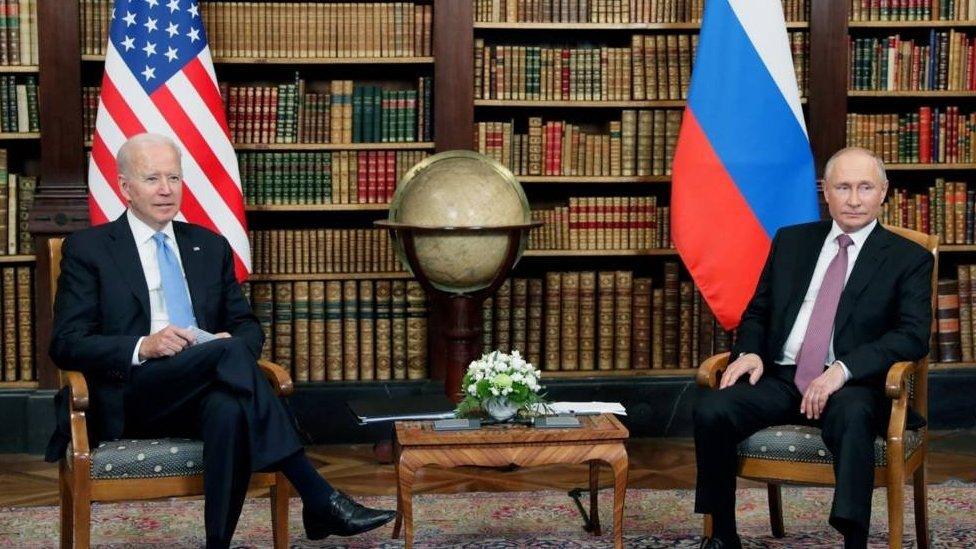Vladimir Putin: Who is the Russian President, and what does he want?
- Published
- comments
WATCH: Who is Vladimir Putin?
Vladimir Putin is the President of Russia, and has been the country's leader for more than 22 years.
He has been in the news a lot recently because of his decision to invade the country of Ukraine.
President Putin has led Russia for a long time, but he's quite a controversial figure and opinions about him are very divided - both in Russia and around the world.
Some see him as a strong, charismatic leader who has worked hard to earn Russia a place alongside some of the most powerful countries in the world. Opinion polls in Russia often say how popular he is among his people.
But critics think he leads by force, that he has taken away many people's freedom, and disagree with how he runs Russia and deals with world affairs.
So, who is this leader? And why do so many people have such different opinions about him?
What was Vladimir Putin's life like before being president?

A school photograph of Vladimir Putin taken in 1966.
Vladimir Putin grew up in an area which is now St Petersburg. He didn't come from a rich background and his childhood was quite tough.
It is reported that he used to get into fights when he was younger with boys who were bigger and stronger than him, which drove him to take up judo and earn a black belt.
According to the Russian government, even before he finished high school, he wanted to work in intelligence, and he later went on to become a spy.
His political career began when he and his family moved to Moscow in 1996, and he quickly became an important political figure.
WATCH: What's it like living in Russia?
Putin was appointed acting prime minister by former Russian president Boris Yeltsin in 1999, and he became the country's official president in December later that year. He has remained in power since then.
Putin presents himself as a strong leader who helped Russia out of economic, social and political problems during the 1990s.
He likes to make a big effort to give off a tough image and likes the cameras to be around when he is putting on a show of strength, whether that is doing judo, fishing or hunting, for example.
Why is he seen as controversial? Why do some people in Russia not like him?

Opinions about President Putin are very divided - both within Russia and around the world.
One issue that has proved particularly controversial is Putin's treatment of LGBT+ people.
His government passed a law in 2013 banning the promotion of homosexuality to people under the age of 18.
Putin says the anti-gay law "does not harm anyone" and Russia's justice department says it is designed to "protect the morals and health of children".
But the European Court of Human Rights has ruled that it is discriminatory and encourages homophobia.
In 2020, Putin suggested a number of changes to the Russian constitution - a list of rules that say how a country should be run - including forbidding same-sex marriages, which was signed into law in 2021.
As well as this, lots of those opposed to Putin do not agree with the amount of power and control that he has over the country - particularly over what the country's media is allowed to say on TV and in newspapers.
They say that media coverage favours the president and that those who do not agree with Putin are not given a voice. Many people have been jailed for speaking out against Putin or forced to leave the country.
They accuse him of making the country less democratic and giving too much control and power to small groups of wealthy people.
There are also those who say he does not run the country in an honest way and some even go as far as to say he is a dictator, doing what he wants by force, regardless of what other people think.
Tense relationships with other countries have also played a part in Russia's economy suffering and there are people who blame Putin for this.
Some people say he has been in power for too long and it is time for someone else to be in charge.
Why do his supporters in Russia like him?

Lots of people believe that Putin is a strong leader
Despite having been in power for a long time, opinion polls reported by Russian media suggest he is still popular with many people.
During his first two terms as president (up to 2008), living standards for many Russian people improved.
The country felt more stable and many feel Putin established a real sense of national pride.
Lots of people believe that his strong image, charisma and firm approach make him a great leader who commands respect.
They feel he has worked to earn Russia a place as one of the most powerful countries in the world.
How do world leaders feel about Putin?

US President Joe Biden met President Putin in 2021.
Some countries have a difficult relationship with Russia and its leader Putin.
The US is one of those countries. One of the issues between the two world powers was whether or not Russia interfered in the 2016 US election to help Donald Trump win. A big investigation took place to look into this, and the Mueller report concluded that Trump hadn't worked with Russia to help him win.
The US and Russia have also disagreed about how major world issues should be dealt with.
Relations with the UK have also been tricky. In 2006, an anti-Putin campaigner and former spy called Alexander Litvinenko was poisoned in London but Russia refused to send a suspect to the UK to face trial over what happened.
WATCH: Why is everyone talking about Russia and spies? (March 2018)
In 2018, another man who used to be a spy called Sergei Skripal and his daughter Yulia were poisoned in Salisbury. Scientists have said that the chemical used for the poisoning was made for the Russian military. The UK blames Russia for the incident, but Russia has denied that it was responsible.
Chinese President Xi Jinping met with Putin recently at the Winter Olympic games and the two said in a joint statement that their strategic relationship has "no limits" and that China supported Moscow's opposition to Nato.
Alexander Lukashenko - the President of Belarus - is an ally of Putin's and allowed Russian troops to enter Belarus to access Ukraine's northern border as part of its invasion of the country.
Why has Putin decided to invade Ukraine?
The history of tensions between Russia and Ukraine.
President Putin launched a military attack on Ukraine on 24 February.
Ukraine used to be part of a group of states called the Soviet Union, which were ruled from Moscow in Russia. Since this group broke up in 1991 and Ukraine became a country in its own right, there has been a kind of tug of war over how it should be governed - particularly over an area called Crimea in the south of the country.
Putin believes that Ukraine should still be a part of Russia. Most Ukrainians are proud of being an independent country and don't see Ukraine as part of Russia.
Russia seized control of Crimea from Ukraine in February 2014 and there has been lots of fighting over this. Many countries around the world do not support how Putin has dealt with this situation.
Russia says it's concerned about its own security and, amongst other things, is worried about the possibility of Ukraine joining a group of countries called the North Atlantic Treaty Organisation - or Nato for short.
Historically, Russia and countries that are a part of Nato (such as the UK and the US) have not always got on.
Putin thinks that if Ukraine joins Nato, the US and its allies will have too much power in an area next to their borders.
Before beginning the invasion of Ukraine, Russian President Vladimir Putin appeared on Russian TV and said that Ukraine was part of Russia, and has warned other nations not to try to stop them.
The UK, EU and other allies said they would bring in tough new sanctions to punish Moscow - the capital of Russia - but said they would not send in troops.
